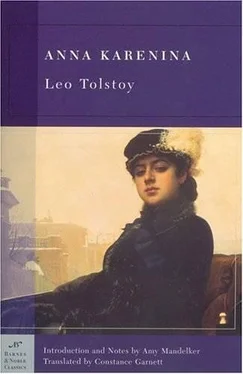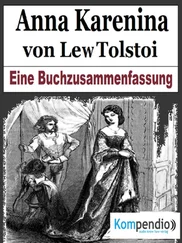Leo Tolstoy - Anna Karenina
Здесь есть возможность читать онлайн «Leo Tolstoy - Anna Karenina» весь текст электронной книги совершенно бесплатно (целиком полную версию без сокращений). В некоторых случаях можно слушать аудио, скачать через торрент в формате fb2 и присутствует краткое содержание. Жанр: Классическая проза, на английском языке. Описание произведения, (предисловие) а так же отзывы посетителей доступны на портале библиотеки ЛибКат.
- Название:Anna Karenina
- Автор:
- Жанр:
- Год:неизвестен
- ISBN:нет данных
- Рейтинг книги:4 / 5. Голосов: 1
-
Избранное:Добавить в избранное
- Отзывы:
-
Ваша оценка:
- 80
- 1
- 2
- 3
- 4
- 5
Anna Karenina: краткое содержание, описание и аннотация
Предлагаем к чтению аннотацию, описание, краткое содержание или предисловие (зависит от того, что написал сам автор книги «Anna Karenina»). Если вы не нашли необходимую информацию о книге — напишите в комментариях, мы постараемся отыскать её.
Anna Karenina — читать онлайн бесплатно полную книгу (весь текст) целиком
Ниже представлен текст книги, разбитый по страницам. Система сохранения места последней прочитанной страницы, позволяет с удобством читать онлайн бесплатно книгу «Anna Karenina», без необходимости каждый раз заново искать на чём Вы остановились. Поставьте закладку, и сможете в любой момент перейти на страницу, на которой закончили чтение.
Интервал:
Закладка:
His brother Sergei Ivanovich advised him to read the theological works of Khomiakov. Levin read the second volume of Khomiakov's works, and in spite of the elegant, epigrammatic, polemic style which at first repelled him, he was impressed by the doctrine of the church he found in them. He was struck at first by the idea that the apprehension of divine truths had not been vouchsafed to man, but to a corporation of men bound together by love- to Church. What delighted him was the thought how much easier it was to believe in a still existing living Church, embracing all the beliefs of men, and having God at its head, and therefore holy and infallible, and from it to accept the faith in God, in the creation, the fall, the redemption, than to begin with God, a mysterious, faraway God, the creation, etc. But afterward, on reading a Catholic writer's history of the Church, and then a Greek orthodox writer's history of the Church, and seeing that the two Churches, in their very conception infallible, each deny the authority of the other, Khomiakov's doctrine of the Church lost all its charm for him, and this edifice crumbled into dust like the philosophers' edifices.
All that spring he was not himself, and went through fearful moments of horror.
"Without knowing what I am and why I am here, life's impossible; and that I can't know, and so I can't live," Levin said to himself.
"In infinite time, in infinite matter, in infinite space, is formed a bubble organism, and that bubble lasts a while and bursts, and that bubble is Me."
It was an agonizing error, but it was the sole logical result of ages of human thought in that direction.
This was the ultimate belief on which all the systems elaborated by human thought, in almost all their ramifications, rested. It was the prevalent conviction, and of all other explanations Levin had unconsciously, not knowing when or how, chosen it, as the clearest at any rate, and made it his own.
But it was not merely a falsehood, it was the cruel jeer of some wicked power, some evil, hateful power, to whom one could not submit.
He must escape from this power. And the means of escape every man had in his own hands. He had but to cut short this dependence on evil. And there was one means- death.
And Levin, a happy father and a man in perfect health, was several times so near suicide that he hid the cord, lest he be tempted to hang himself, and was afraid to go out with his gun, for fear of shooting himself.
But Levin did not shoot himself, and did not hang himself; he went on living.
X
When Levin thought what he was and what he was living for, he could find no answer to the questions and was reduced to despair; but when he left off questioning himself about it, it seemed as though he knew both what he was and what he was living for, acting and living resolutely and without hesitation; even in these latter days he was far more decided and unhesitating in life than he had ever been.
When he went back to the country at the beginning of June, he went back also to his usual pursuits. His agriculture, his relations with the peasants and the neighbors, the care of his household, the management of his sister's and brother's property, of which he had the direction, his relations with his wife and kindred, the care of his child, and the new beekeeping hobby he had taken up that spring, filled all his time.
These things occupied him now, not because he justified them to himself by any sort of general principles, as he had done in former days; on the contrary, disappointed by the failure of his former efforts for the general welfare, and too much occupied with his own thought and the mass of business with which he was burdened from all sides, he had completely given up thinking of the general good, and he busied himself with all this work simply because it seemed to him that he must do what he was doing- that he could not do otherwise.
In former days- almost from childhood, and increasingly up to full manhood- when he had tried to do anything that would be good for all, for humanity, for Russia, for the whole village, he had noticed that the idea of it had been pleasant, but the work itself had always been incoherent, that then he had never had a full conviction of its absolute necessity, and that the work that had begun by seeming so great, had grown less and less, till it vanished into nothing. But now, since his marriage, when he had begun to confine himself more and more to living for himself, though he experienced no delight at all at the thought of the work he was doing, he felt a complete conviction of its necessity, saw that it succeeded far better than in old days, and that it kept on growing more and more.
Now, involuntarily it seemed, he cut more and more deeply into the soil like a plough, so that he could not be drawn out without turning aside the furrow.
To live the same family life as his father and forefathers- that is, in the same condition of culture- and to bring up his children in the same, was incontestably necessary. It was as necessary as dining when one was hungry; and to do this, just as it was necessary to cook dinner, it was necessary to keep the mechanism of agriculture at Pokrovskoe going so as to yield an income. Just as incontestably as it was necessary to repay a debt was it necessary to keep the patrimonial estate in such a condition that his son, when he received it as a heritage, would say "Thank you" to his father as Levin had said "Thank you" to the grandfather for all he had built and planted. And to do this it was necessary to look after the land himself, not to let it, and to breed cattle, manure the fields, and plant timber.
It was impossible not to look after the affairs of Sergei Ivanovich, of his sister, of all the peasants who came to him for advice and were accustomed to do so- as impossible as to fling down a child one is carrying in one's arms. It was necessary to look after the comfort of his sister-in-law and her children, and of his wife and baby, and it was impossible not to spend with them at least a short time each day.
And all this, together with shooting and his new beekeeping, filled up the whole of Levin's life, which had no meaning at all for him, when he began to think.
But besides knowing thoroughly what he had to do, Levin knew in just the same way how he had to do it all, and what was of more importance than the rest.
He knew he must hire laborers as cheaply as possible; but to hire men under bond, paying them in advance at less than the current rate of wages, was what he must not do, even though it was very profitable. Selling straw to the peasants in times of scarcity of provender was what he might do, even though he felt sorry for them; but the tavern and the pothouse must be put down, though they were a source of income. Felling timber must be punished as severely as possible, but he could not exact forfeits for cattle being driven into his fields; and though it annoyed the keeper and made the peasants not afraid to graze their cattle on his land, he could not keep their cattle as a punishment.
To Piotr, who was paying a moneylender ten per cent a month, he must lend a sum of money to set him free; but he could not let off peasants who did not pay their rent, nor let them fall into arrears. It was impossible to overlook the bailiff's not having mown the meadows and letting the hay spoil; and it was equally impossible to mow eighty dessiatinas where a young copse had been planted. It was impossible to excuse a laborer who had gone home in the busy season because his father was dying, however sorry he might feel for him, and he must subtract from his pay those costly months of idleness, but it was impossible not to allow monthly rations to the old servants who were of absolutely no use.
Levin knew also that when he got home he must first of all go to his wife, who was unwell, and that the peasants who had been waiting for three hours to see him could wait a little longer. He knew too that, regardless of all the pleasure he felt in taking a swarm, he must forego that pleasure, and leave the old man to see to the bees alone, while he talked to the peasants who had come after him to the beehouse.
Читать дальшеИнтервал:
Закладка:
Похожие книги на «Anna Karenina»
Представляем Вашему вниманию похожие книги на «Anna Karenina» списком для выбора. Мы отобрали схожую по названию и смыслу литературу в надежде предоставить читателям больше вариантов отыскать новые, интересные, ещё непрочитанные произведения.
Обсуждение, отзывы о книге «Anna Karenina» и просто собственные мнения читателей. Оставьте ваши комментарии, напишите, что Вы думаете о произведении, его смысле или главных героях. Укажите что конкретно понравилось, а что нет, и почему Вы так считаете.












